21 years after he created his website, Emotion Eric is still the best at emotions
Just not on the internet.
- Jan 7, 2020
- Comments

Eric doesn’t want you to know he’s that Eric, the Eric who in 1998 created Eric Conveys an Emotion, a website where he shared pictures of himself portraying crowd-sourced emotions in ways so comedic and universally appealing that he gained a Wikipedia-worthy amount of internet fame from the late ’90s into the early aughts, a time when the pool of internet celebrities was, compared to today’s ever deepening abyss of Instagram influencers, YouTubers, bloggers, and more, the size of a thimble for a hamster.
I didn’t know Eric was that Eric the first time I met him on September 17, 2011. That night, my friend Christine invited me out to dinner with her friends June, Mike, and Eric. Since I had never met these friends before, Christine told me a bit about each one, describing Eric merely as “my friend who works in an ice cream shop,” not the more accurate “my friend who created one of your favorite websites of your teenage years, aka [shrieking] EMOTION ERIC [/shrieking].”
When I met Eric at dinner, he looked familiar to me almost right away. This is what happens when the thing that made you famous is your face. But…nah, he couldn’t be that Eric. Because if he were that Eric, Christine surely would’ve told me. Because Christine is a good, trustworthy friend, not the kind of “friend” who lies by omission. (Just to clarify, Christine is a good, trustworthy friend. She was simply unaware of Eric’s internet famous past at the time.) So I assumed my faulty face memory was leading me astray and that there were possibly more than one Asian-American Eric who shared similar features. This Eric was Ice Cream Eric, an Eric whose face I had never seen before and I knew nothing about.
But I thought maybe I could prod a bit without outright asking, “HEY, U EMOTION ERIC?” Doing so would’ve broken one of my cardinal rules when meeting new people, which is to avoid making a first impression that screams “potential stalker” (that’s a “third impression or later” kind of thing). So with all the confidence of a freshman scanning the cafeteria for an empty seat on her first day of high school while quelling a ripple of nausea, I asked, “So does anyone…have…web…sites?”
Eric didn’t bite. My bowels wobbled at the thought that I may have all look same-ed him.

After dinner, we hopped into Christine’s car to get dessert at Eric’s place of ice cream employment, Ample Hills. At some point we ended up in New Jersey by mistake, as sometimes happens when you’re driving from the Upper West Side to Brooklyn. (If you’re not familiar with NYC geography, just trust me on this. Don’t, uh, look at a map or anything.) The interstate detour complicated Christine’s drive, but no one minded the extra bonding time in the car, except for maybe Christine, who held all our lives in her steering wheel-clutching hands.
As the radio played in the car, June started reminiscing about her car-centric days of yore in Southern California where one of life’s regular joys was listening to the radio while driving. Eric hopped into the conversation by bringing up the time he was interviewed by Kevin and Bean, the popular morning talk show hosts of LA’s KROQ station. Christine then asked why he was on the radio.
“Did they interview you because of Emotion Eric?” asked June.
Before Eric could respond, I reacted with something like this:

“YOU’RE EMOTION ERIC? AND YOU DIDN’T TELL ME? AAGHARGHARHGAHH”
[Pounds back of Eric’s headrest as I, someone Eric has only known for three hours but was yelling with the kind of ferocity fueled by long-simmering betrayal, was sitting right behind him.]
“BLERGHRGEHUG OH MAH GAAAWDDDD“
[Shakes Eric’s seat some more as though I’m going to Hulk-rip it off.]
“[MORE UNINTELLIGIBLE YELLING]”
My outburst could’ve made Christine drop me off on a random curb in New Jersey for the safety of everyone in the car not named Robyn. Luckily for me, forgetting to act respectably was my ticket into this new group of friends.

The rest of the night went better than our dinner. Christine eventually got us to Ample Hills, where Eric did an A+ job of “person who works at an ice cream shop” by feeding us plenty of ice cream. Afterward, we retreated to Eric’s apartment to hang out and play games. I didn’t get back to my apartment until 2 a.m.

Over the next eight years of being friends with Eric, I badgered him constantly about updating his website. When I moved to Norway in 2015 and could no longer badger him in person, I badgered him through IMs instead. I thought it was all in good fun because, you know, people love being told over and over and over again to do the thing they willingly stopped doing years ago. He was too nice to tell me to stop. Well, the joke’s on him: I’ve taken over a thousand photos of him over the years, so I can make my own Emotion Eric website now, BWAHAHAHA, just kidding but am I? it’s the ones you least suspect who are the biggest threats anyway how legally binding is a restraining order?
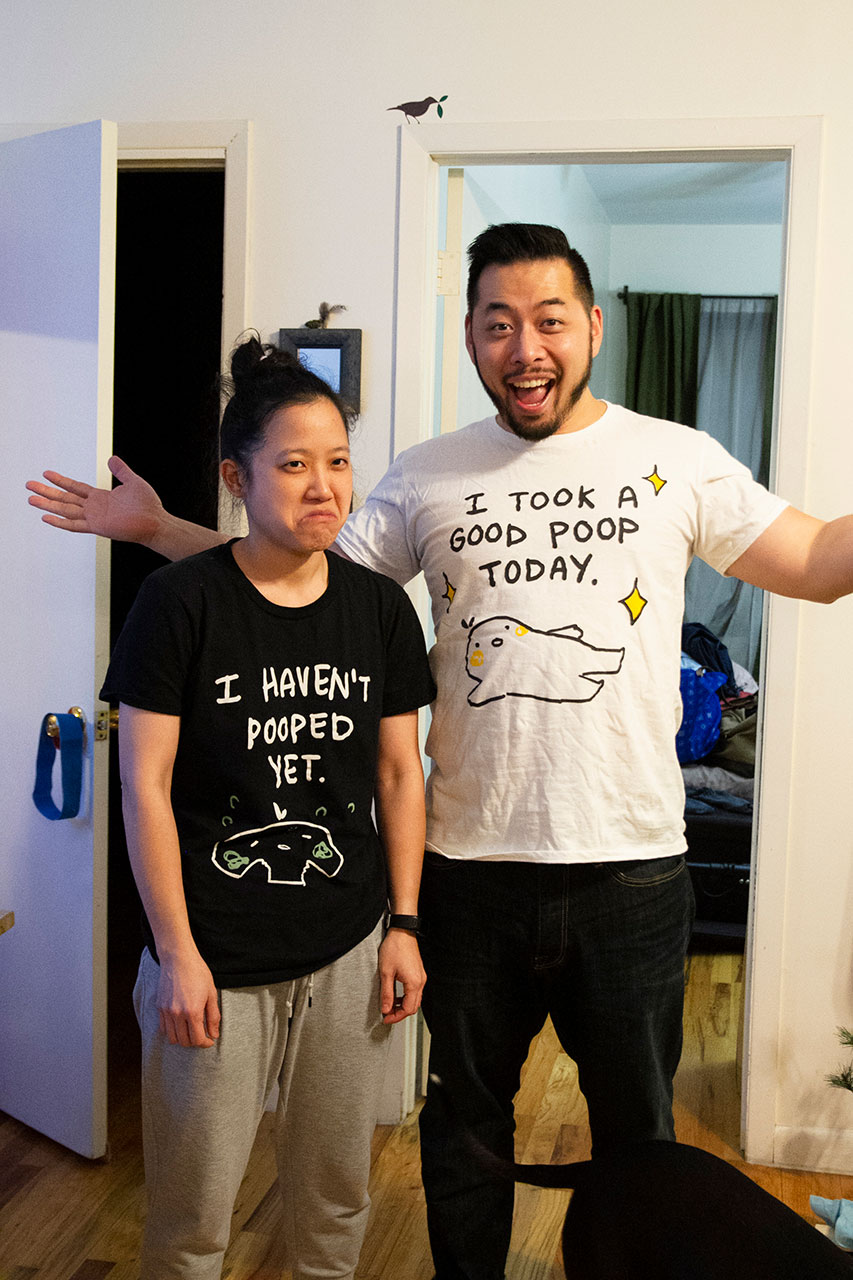
I could’ve spent those years learning about Eric’s internet past, but I didn’t. Our hanging-out time was mostly spent telling poop jokes, making dumb noises and faces, playing board games, and stuffing ourselves with food. Sometimes we did all of the above at the same time. I’m not complaining—those are all my favorite activities. But I wanted to know more.
Using the 20th anniversary of Emotion Eric as an excuse to do some digging (an anniversary that is now beyond its 21st year because self-imposed deadlines are as effective as single-ply toilet paper combined with turbulent indigestion), I interviewed Eric when I visited New York in December 2018 for vacation. And by “interviewed” I mean “without having done any prep, I asked him random questions as we sat in his living room.” During our first interview, my husband, Kåre, and I chatted with Eric for an hour as we half-watched Jackie Chan’s 2001 movie The Accidental Spy for no particular reason besides that it happened to be playing on TV. During our second interview, I along with an impromptu roundtable of our friends Kareem, Tam, and Diana lobbed questions at Eric for one-and-a-half hours.
This is my way of impressing the fact that these interviews weren’t conducted in any professional way. Subsequently, this post wasn’t written in a professional way either. Enjoy!
Why did Eric stop updating his website?

The simplest explanation: Eric only updated his website for fun, so when the fun ran out, he stopped updating it. He tried other ways to flex his creative muscles, like when he introduced the multi-photo Adventure format in 2002, but coming up with worthwhile emotions to post ultimately became a chore. “After a few hundred [emotion requests], there aren’t that many good ones left,” he said.
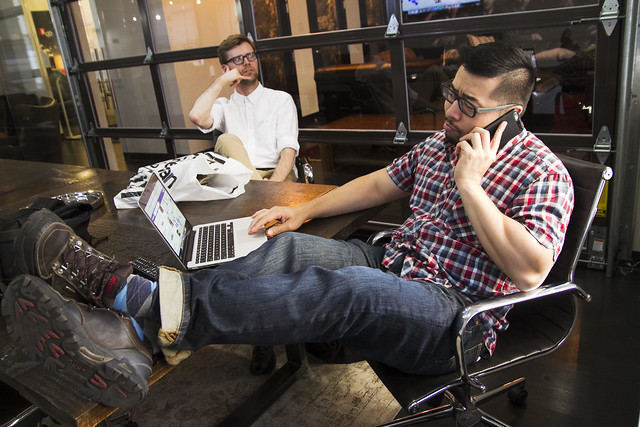
There was also the thing that normally sucks up one’s time: work. Eric started working at Yahoo in 2004 as a front-end engineer on Yahoo Personals. A few years later, he moved to a team called Yahoo for Good that worked on philanthropic projects unrelated to the business. His last position was running Yahoo’s internal and external hack program (“hack” as in “creative problem solving/innovation”, not “breaking into computers”). In 2011, he quit his job, sold all his stuff, and moved to New York City for the hell of it.
Eric has been doing a lot since his post-Emotion Eric life, just mostly off the internet.
What kind of stuff?
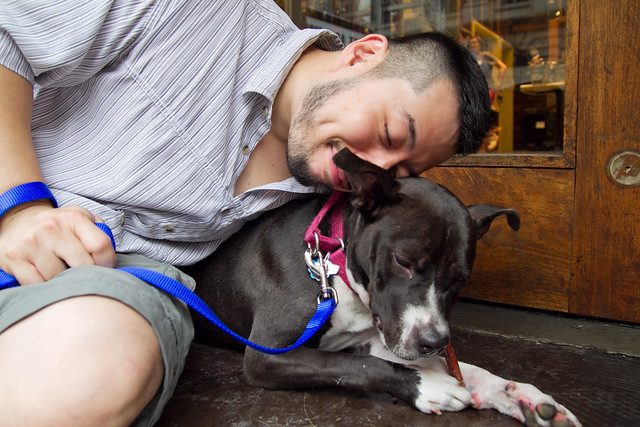
Here’s a quick timeline of Eric’s life since he last updated his website in 2008:
- 2008: Lives in the Bay Area and works at Yahoo.
- 2011: Quits Yahoo, sells all his stuff, and moves to New York City with no long-term plan nor potential job. After finding an apartment in Brooklyn, starts working at the newly opened ice cream shop Ample Hills and soon becomes their General Manager. Also works as a hackathon consultant.
- 2013: Adopts the best dog ever, Zelda!!! Such a good gurl!!!
- 2014: Leaves Ample Hills because ice cream money can only take you so far.
- 2015: Becomes the Executive Director of tech education non-profit hackNY.
- 2018: Leaves hackNY. Travels around Europe and the US for a few months.
- 2019: Chills out with Zelda while figuring out what to do next.
Other stuff happened in between, but that’s the gist.
Cool…but actually, all I care about is EMOTION ERIC. How did Eric come up with the idea for his website in the first place?
The idea was born largely from boredom and watching TV. During the summer of 1998 when Eric was attending the summer semester at the University of Florida and growing increasingly bored because nobody else was around, he decided to put a new section on his personal website. But what section could be worthy of sitting alongside masterful content such as “The Jackie Chan Image Gallery” or “About Me”? He didn’t know.
Until one fateful night at Dairy Queen with his friends changed everything.
“One of my friends said, ‘Eric, you’re always making these funny faces.’ And I’m like, ‘Oh, okay,’” Eric said with a laugh.
…Nevermind. Eric still didn’t have any ideas.
Until Andy Richter changed everything. During this time, Eric watched Late Night with Conan O’Brien every night. In one of the show’s recurring bits, “Andy Conveys an Emotion,” Conan’s sidekick, Andy Richter, would be eating in the cafeteria alone, only to have his meal interrupted by a command to convey a certain emotion. After conveying the emotion, Andy would return to his meal. (I couldn’t find a clip of “Andy Conveys an Emotion”, but here’s a screencap where he conveys “loneliness.”) According to my cursory internet sleuthing, hardly anyone today remembers this bit except for archives of Late Night with Conan O’Brien episode descriptions and Eric himself.
Inspired by the average-ness of “Andy Conveys an Emotion” and the encouragement of multiple friends who told him he was good at making funny faces, Eric added “Eric Conveys an Emotion” to his website.
Eric has no idea if the people at Late Night with Conan O’Brien ever knew about the influence they had on his website, but as a big fan of Andy Richter, he did write Andy a letter during college in which he mentioned his website. In response, Eric received an autographed photo of Andy Richter in a manila envelope that reached his parents’ mailbox despite being unstamped.
Years later, Eric made a fansite about Andy to develop his website-making chops. But bored of the gushing style of typical fansites, he made his an anti-fansite. It featured the same kind of info you’d expect on a fansite, just glued together by loathing instead of praise. You can still visit the site at the Wayback Machine’s archive of andyrichtersucks.com.
How did Eric’s website become popular?

Through the power of Eric’s AWESOME FACE, combined with the power of random people on the internet taking great joy in the ability to make Eric do their bidding.
After Eric ran out of ideas for his website—that is, after he had laid down about ten basic emotions—he turned to his friends for help. But instead of simply asking them, “Hey, what faces should I make?” he set up a request form on his website and sent them the link. All went according to plan: they threw a bunch of emotions at him, and he emoted them all. And then a few weeks later, all did not go according to plan: strangers started making requests as well. Eric thought it was weird considering he had only shared the link with people he knew, but since his website was public, he followed through on the strangers’ requests.
The traffic on Eric’s website kept increasing despite that Eric wasn’t doing anything to publicize his website. He didn’t have his own domain name, just the unmemorable URL his free host made up for him. Random people were finding his website through link aggregators like Stumbleupon and Yahoo, as well as virtual word of mouth thanks to people passing the link to their friends and posting it on bulletin boards and forums.
Eric was zero prepared for the onslaught of visitors. His free webhost kicked him off after a year because he had too much traffic, leaving him to scrounge around for another host at a time when the options were few and expensive. He didn’t even have a digital camera in the early years.
How did Eric take pictures of his face without a digital camera?
He used his camcorder to shoot video of his face, then hooked up his camcorder to his TV card-equipped computer and took screenshots of the video. Thanks to his experience filming and editing videos in high school, he found this process easy (or at least easier than using a film camera and scanning the prints). His camcorder-as-a-camera method lasted about three years before he got a digital camera whose quality exceeded his camcorder’s.
Did people steal Eric’s ideas?
People tried. Poorly. As his website became more and more popular, “there’d be copycats where someone would copy the exact same layout and format, and then just change it to ‘Dave conveys an emotion’ or whatever,” Eric said. But instead of getting bothered by it, he welcomed the competition. “To me it was always funny. If they can do it better than me, then kudos, hats off to you. Go ahead and take it!”
But no one took over the mantle of “Best Emoter”. Because, as Eric recalled, the copycats were terrible. He didn’t realize how good he was at making emotions until he saw how poorly other people did it.
How did Eric deal with his fans in real life?

Awkwardly, and then less awkwardly. At the height of the website’s popularity, fans would come up to Eric at any time, at any place. “It was always so awkward because I’m not used to that,” he said. “They would come up and ask, ‘Are you…are you Emotion Eric?’ And then I’d be like, ‘Uh…yeeeeah?’ But after that, there’s nowhere to go. Okay, you identified me and I confirmed. And then they would usually start making requests. ‘Can you…do happy!‘”
He conceded to fans’ emote-on-command requests the first couple of times, but he stopped soon after to retain his sense of dignity, instead directing his fans to his online request form. Although this didn’t put an end to the awkwardness, it helped lessen it a bit.
But less was still too much, and the fans kept on coming. Eric’s fans wanted something—a photo, a satisfying interaction, a memento of some sort. And Eric wanted to give them something, as long as it was on his terms and not terribly awkward. His solution was to make stickers and business cards with his face on them.
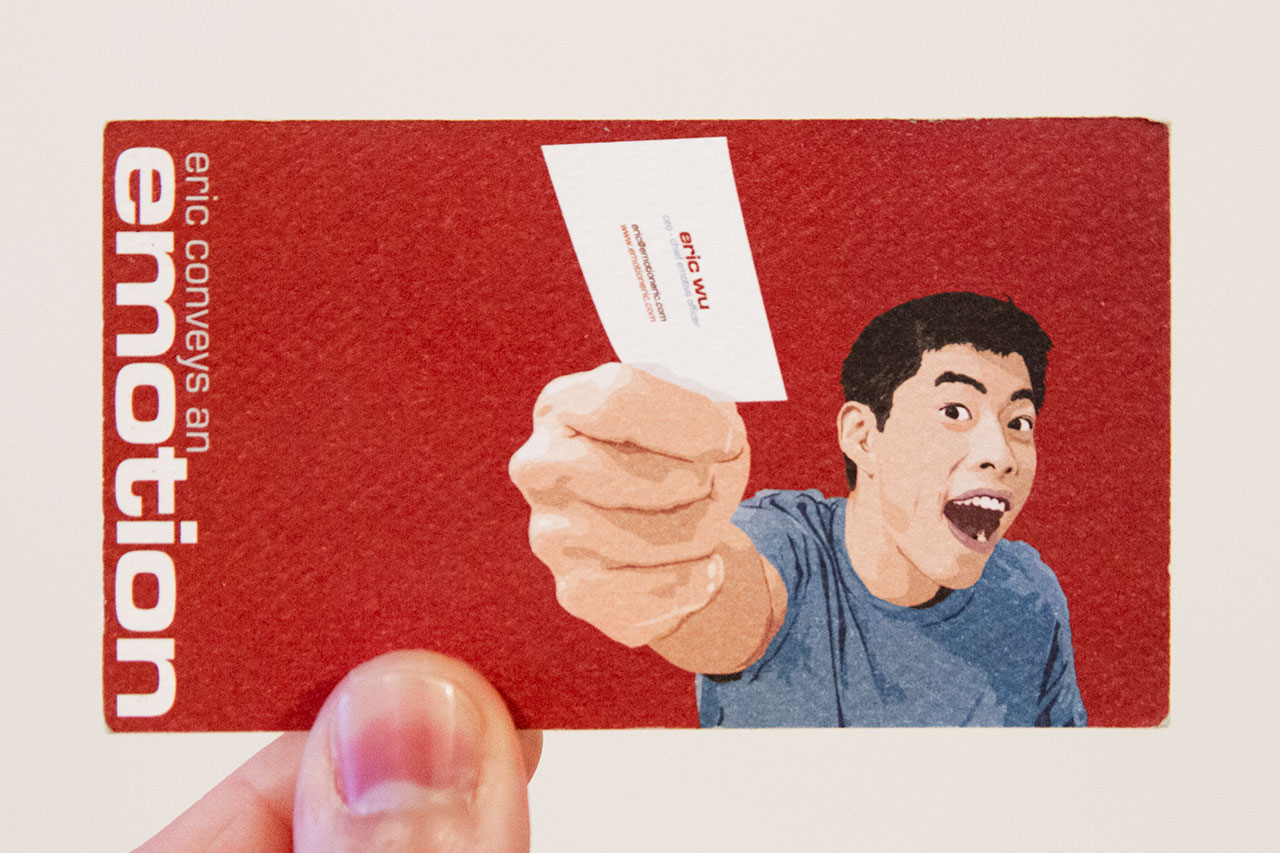
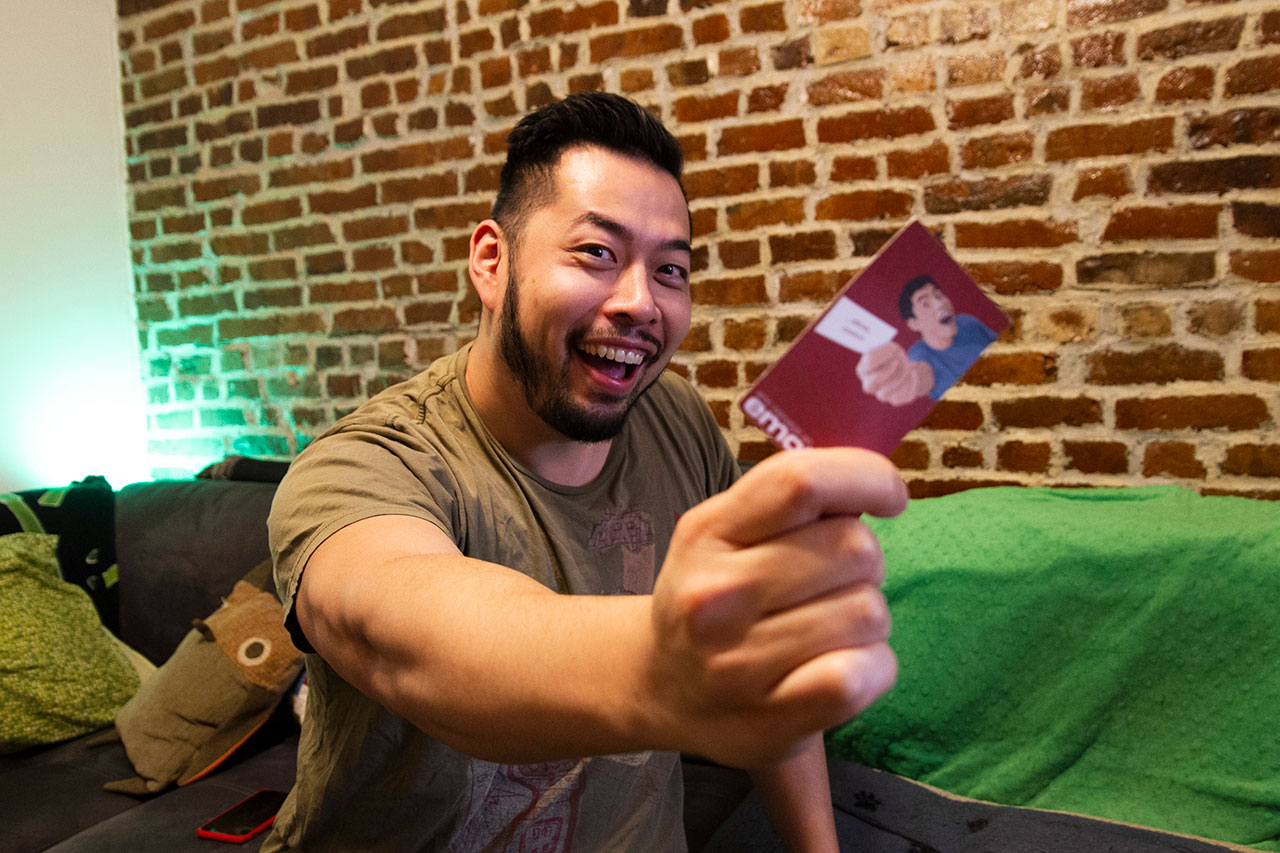
He’d hand over his business card in the same pose as illustrated on the card. The fans would leave happy, and Eric would avert prolonged awkward interactions.
Eric’s most successful/least awkward fan interactions were the ones he arranged himself. For a few years, when he traveled to different cities—London, Tokyo, San Francisco, Boston, and more—he’d announce his travel plans on his website and set up a time and place to meet, not knowing if anyone would show up. “And then people would show up!” he said. “Anywhere between five and twenty people would just show up, and we would all hang out and be friends.”
How did Eric deal with fanmail?
Selectively, out of necessity. If you ever wrote Eric an email during the height of his popularity but never got a reply, don’t feel bad. Most people never got a reply. It was nothing personal (unless you were nuts)—Eric simply received too many emails to be able to reply to every single one. But he read them all. Here are some of the emails he remembers most clearly.
The best email: One fan emailed Eric with the subject line “Thank you for saving my life” to let him know his website pulled her back from the brink of suicide. Besides that his pictures made her laugh, she told him she was inspired by the good things his website was doing for other people.
The celebrity email: Eric once received an email from Eminem thanking him for making a website that made his daughter Hailie happy. He told Eric to get in touch with his management if he ever wanted to see one of his concerts, an offer Eric never took up since he wasn’t sure if the email was actually from Eminem. (Today he thinks it probably was. It was harder to be sure of these things in the pre-social media era.)
The stalker-y emails: One female fan emailed Eric almost every day for a few months with messages along the line of “I love you,” and “We should get married.”
The emails from teachers: Eric received multiple emails from people telling him they used his website as a teaching tool, such as teachers using his photos in language classes and therapists using his photos to teach emotions to kids with autism.
The emails from Asian fans: Asian fans emailed Eric to express their gratitude over seeing Asian representation in American pop culture—comedy, more specifically—that wasn’t stereotyped. (We didn’t have much in the mid-2000s. Remember William Hung? Yeah.)
The emails from an anonymous Hollywood agent: A mystery person emailed Eric multiple times with unsolicited career advice pertaining to the entertainment industry. When Eric was living in Southern California, Mystery Agent recommended that he check out a couple of casting calls, but he never followed through. He didn’t see himself as an actor, just someone who made stupid faces. (At this point in the interview, I along with our other friends chided Eric for not fulfilling his clear destiny of becoming Asian Andy Richter. Then we laughed wildly at Eric’s star potential that never came to be.)
The hate mail: The worst part about the hate mail Eric received is that, in his opinion, he didn’t get enough of it. “I would actually look forward to those because it was a good counterbalance,” he said. Of course, he appreciated the people who showered him with love, but if more of you had virtually punched him in the face, he would’ve been okay with it. (He no longer welcomes virtual face punches. If you wanted to do it back in the day, you’ve missed your chance.)
Did Eric get cool freebies through his website?
Eric got some freebies, the coolness of which is up to you to judge. Like that time he received complimentary tickets to see the Blue Man Group during a trip to Las Vegas. All it cost him was a smidge of awkwardness before the start of the show when, without his knowledge, there was a screen in the theater playing a segment listing famous people in the audience. Eric was listed as one of the famous people. “I mean, nobody knew who I was,” he said.
Another memorable freebie came during a visit to a Coldstone Creamery when the employee who took Eric’s milkshake order recognized him. After Eric hesitantly confirmed that he was Emotion Eric, the employee told him he loved his website. “He says, super smooth, ‘Your money’s no good here.’ And he gave me a free milkshake. I’m like, oh, nice!“
“So that was the highlight of your freebies?” I asked.
“Yes. That was the pinnacle.”
Eric received mostly good offers through his fame. Except for one recurring theme.
“Lots of people offered me sex.”
Eric never took up the offers.
How did Eric deal with press coverage?
Awkwardly, and then…still awkwardly. During the peak of his website’s popularity, Eric was interviewed by local TV news, radio stations, magazines, and more. Although he doesn’t remember all the interviews, he does remember being a terrible interviewee who only gave really short answers. But you can’t blame him considering the kinds of questions he fielded.
“The number one thing that everyone asked was, ‘So are you an emotional guy?’ And I’d respond, ‘Naah. Nah, not really.’ And then they’d follow up, ‘Uh, oh, okay. Well, what’s your favorite emotion?’ I’d say, ‘Ah, I dunno. I like ‘em all!’ And they’d be annoyed at my terrible answers.”
Eric shared one interview-related story in which he unintentionally wasted a magazine’s photography budget. In their February 11, 2000 issue, Entertainment Weekly heralded Eric as one of their “Unsung Heroes of the Web”. To illustrate this quarter-page of print, EW set up a professional photoshoot with Eric in a rented studio. As Eric recalled, makeup artists and stylists “put makeup on me and weird stylish clothes that I would never wear.” Comfortable, he was not. But he did at least become chummy with the photographer.
During lunch time, Eric went out with the photographer to get something to eat near the studio. As they walked around, they came across a photo booth. The photographer suggested Eric take a few photos in the booth. Doing what he does best, Eric made a bunch of faces and put the photo booth props to good use.
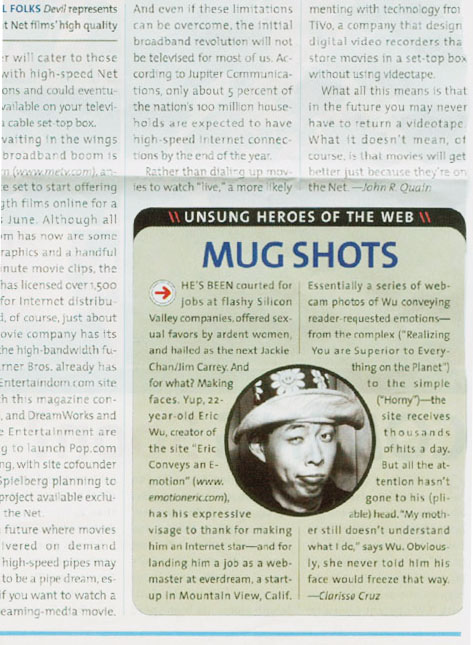
The magazine ended up using one of the photobooth pictures in the article. Eric has never seen the photos from the professional photoshoot. (If you have them, GIVE THEM TO ME, please.)
How did Eric’s family react to his internet fame?
With delayed pride. During the height of Emotion Eric’s popularity from 2000 to 2003, Eric’s parents didn’t know about his website. They only found out later when a relative told them about it. Even though his parents didn’t totally understand what the website was—according to Eric, they described his website to others along the lines of, “He goes on the internet and he makes a face”—they got the gist that he was doing something that made people happy.
“It’s clear they were proud of it,” Eric said, “but they weren’t exactly sure what it was. All they knew was that other people liked it, and that was good enough.”
“Were any of your family members or relatives like, Wow, you’re the coolest!?” I asked.
Eric’s initial answer was a drawn-out “nooooo,” but he did eventually remember that his cousin’s teenage son was a super fan who’d always ask when the next update was coming and wear his Emotion Eric T-shirt with pride.
Did Eric make any money from his website?
Nope. Not for his own gain, at least. Eric never put ads on his website, despite the repeated requests. He also turned down most of the business opportunities he was offered. He acknowledged that getting free hosting for the first 12 years of his website helped give him the freedom to leave money on the table, but that wasn’t the only reason.
“I never wanted to make money because making money just off my face is weird,” Eric said. “But then fans kept on asking for merchandise. How could I figure out a way for people to buy stuff, but also where I don’t keep any of the money?”
“COOL,” I said.
“Yeah, that’s what people want to do normally, right?”
In 2001, Eric started selling Emotion Eric T-shirts to appease his hungry fans. To appease his aversion to keeping money, he donated all the proceeds to two children’s hospitals: the Child Life Department at the Medical College of Virginia Hospital, where his sister was working, and the Lucile Packard Children’s Hospital in Palo Alto, CA, where he was a volunteer. Canadian graphic designer Ryan Schmidt whipped up some T-shirt designs for free. And with Ryan’s designs, the T-shirts were born.
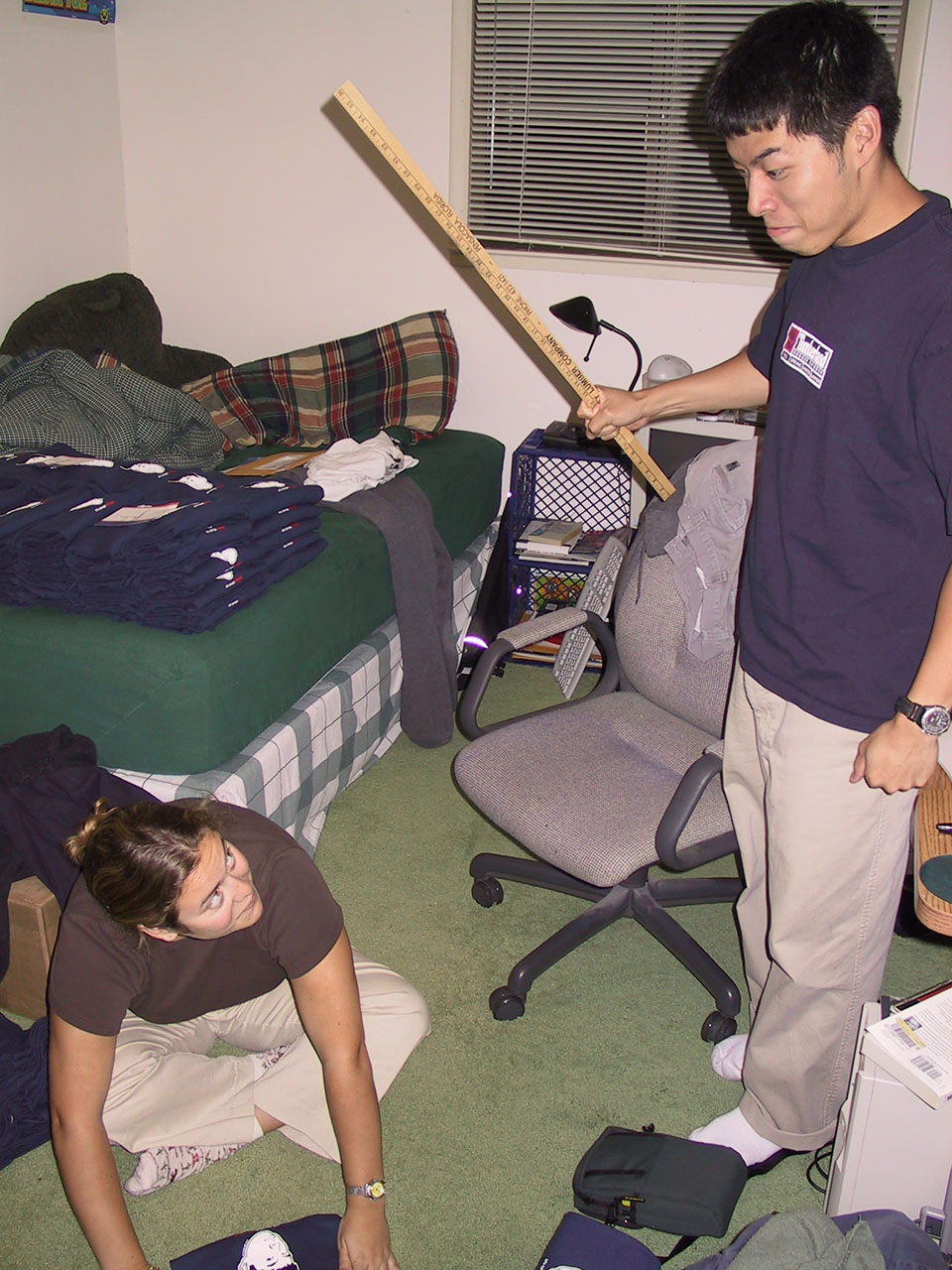
To get through his mountain of inventory, Eric held T-shirt packing parties at his house where he invited three to six friends to help him on his T-shirt packing assembly line. He rewarded them with pizza and printed fake awards with titles like “Best T-shirt Packer”.
From 2001 to 2003, Eric raised thousands of dollars thanks to his fans buying about 1,500 T-shirts featuring his “intrigue” face and “Emo” cartoon form. He donated most of the proceeds as emotion-less money, but in 2002, he wanted to do something more special for the hospital where he volunteered, the Lucile Packard Children’s Hospital.
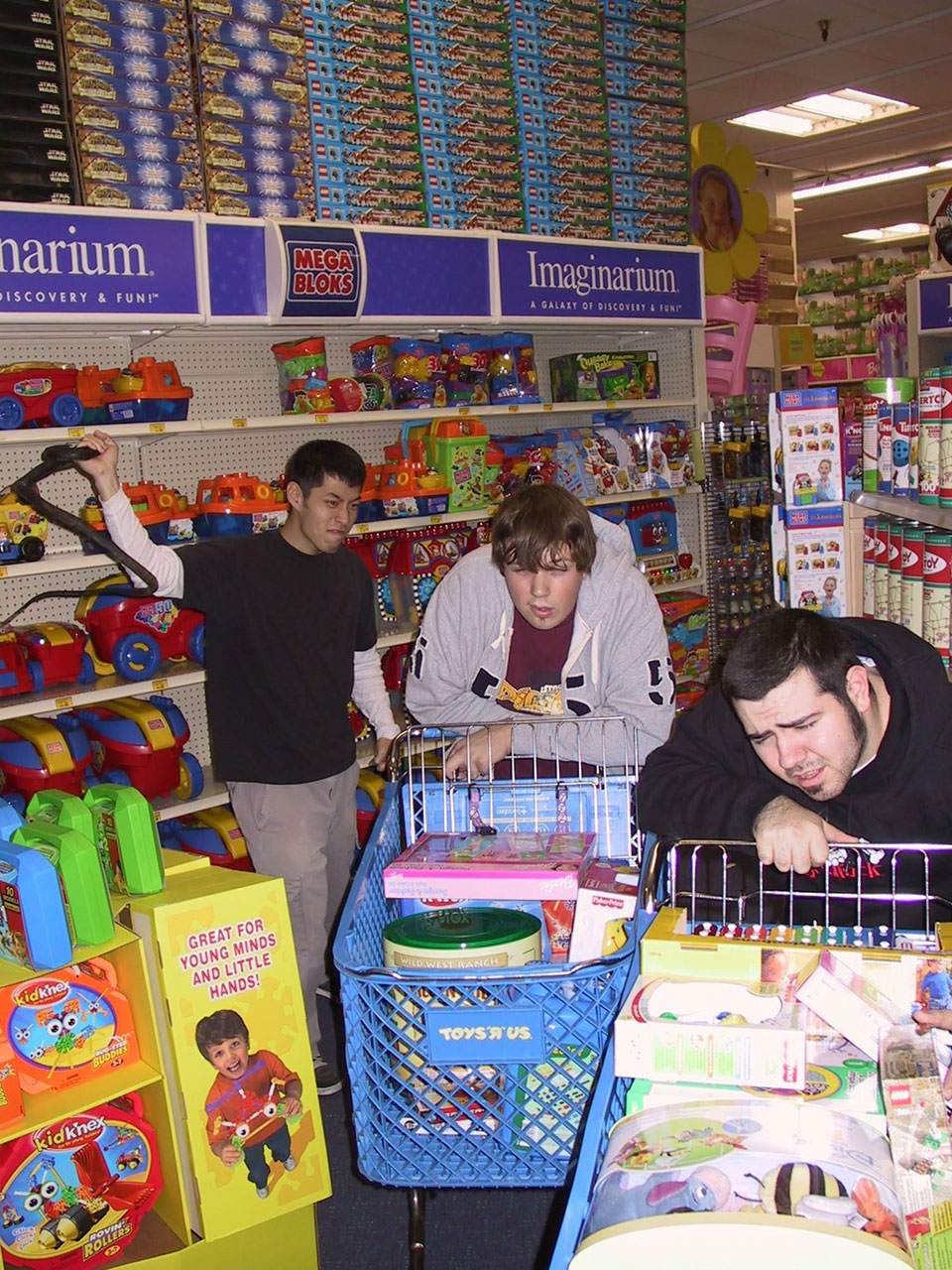
One day during the Christmas season, he and a few friends gathered at a local Toys R’ Us. The mission: spend as much T-shirt money as possible on a big-ass shopping spree. The result: three shopping carts stuffed with thousands of dollars of toys for kids of all ages, so many that they struggled to fit them all into Eric’s car. After securing all the toys, Eric drove to the hospital and dropped them off with the formality of someone delivering a pizza.
“They weren’t expecting [the toys]. And also, they didn’t care because they get donations all the time,” Eric said while laughing. “I didn’t tell them what the story was. To them it was just, oh, here’s another company giving us donations.”
“But it’s just you!” I said.
“I know. But to me, I didn’t care. As long as the kids got the toys, it was fine.”
Did Eric milk his website for its career-advancing opportunities?
Not really. He didn’t have to because other people did it for him. By the time Eric graduated from college at the end of 1999, his website had become so popular that people were telling him he could get whatever job he wanted from it. But he didn’t want to sell himself based on the popularity of his website. He left his website off his resume and out of the interview room with the goal of earning a job based on his technical merit, not his face.
I pointed out that his website was a part of his technical merit.
“I mean, yes, looking back now,” Eric said, “back then, not many people actually rolled their own website. I programmed it. I made that website from scratch. But I kept thinking, I want to get a job because of me, not because of the Emotion Eric site.”
“Okay. Which is all you.”
“Yeah,” he said, laughing.
Armed with his degree in economics and years of CS classes, Eric continued his job hunt sans his Emotion Eric background. But it was all for nothing. Soon after he graduated, he received an email from the CEO of a business IT start-up called Everdream. In the email, the CEO told Eric he was a fan of his website, and knowing Eric was about to graduate, he offered to fly Eric to the Everdream office in California for an interview.
“To me, that sounded ridiculous,” Eric said. “I’m like, what? You don’t even know me. Why? I didn’t even send out my resume. It’s a cold email from a CEO out in California that’s just saying, come on out.”
Confused as to why anyone would offer him a job just based on his website, Eric didn’t take the offer seriously. He sent back a casual reply accepting the offer, figuring he wouldn’t hear back. The CEO replied right away.
During Eric’s first visit to the Everdream office, the staff didn’t know that Eric was coming, but they all knew who he was. He stopped at almost every desk as people told him how much they loved his website. Some people took photos of him. That was the first time he could remember being surrounded by a concentrated number of fans. And then came the job interview.
“It wasn’t even really an interview. It was more, ‘What job do you want?’” Eric attempted to treat it like an interview, describing his skills and internship experience, as well as offering his resume and referrals as proof of his competency. But Everdream had probably made their decision to hire him before he stepped into their office.
Starting in 2000, Eric ran and built Everdream’s corporate and external websites as the company’s webmaster. Two-and-a-half years later, his time at Everdream came to an end when he, along with many other staff members, got laid off in the wake of the economic downturn. Even though he had a great time at Everdream, gaining valuable experience and friends he’s still in touch with today, he wasn’t too broken up about losing his job. He felt like he was ready to move on.
Would Eric ever bring his website back to life?
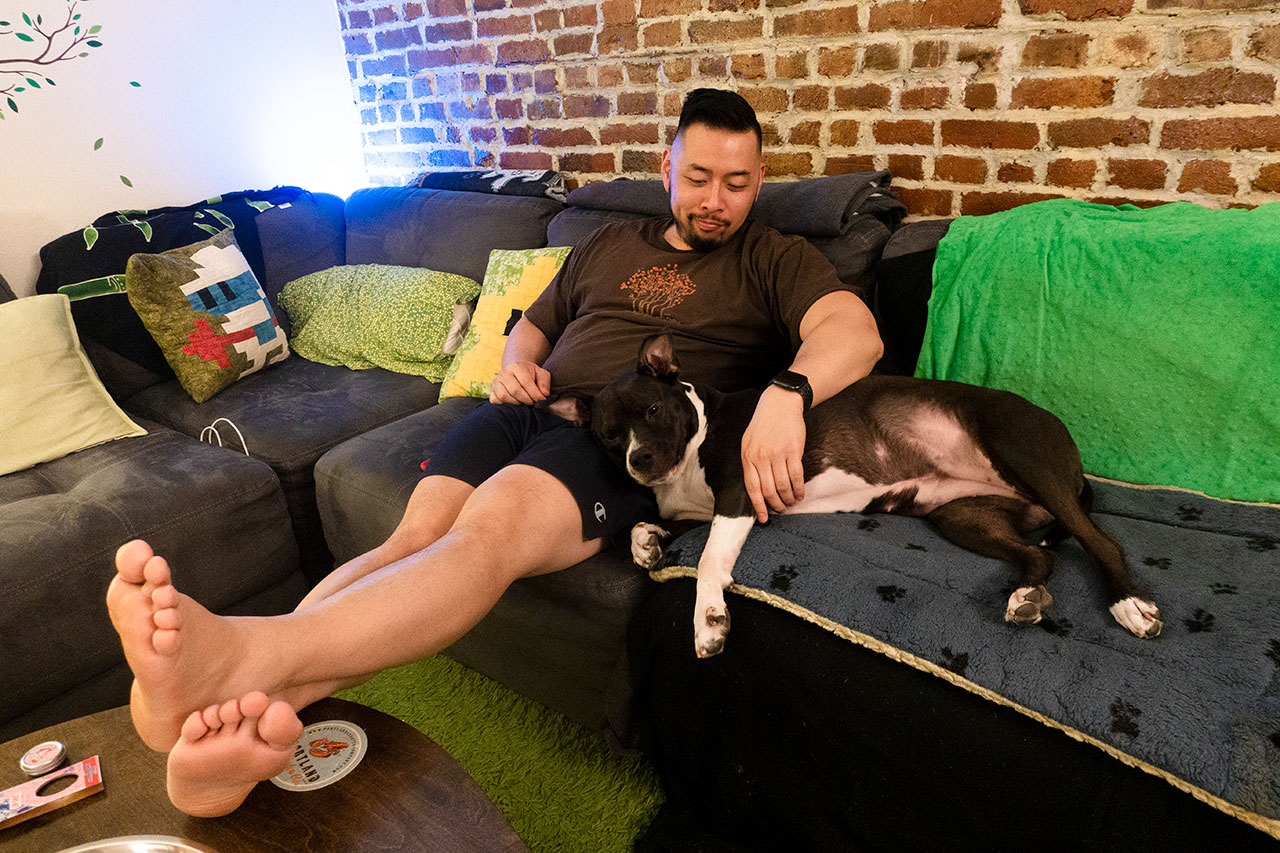
The last update on Eric’s website was April 1, 2008. There’s no good-bye message, nothing that says, “That’s it, I’m done.” That leaves open the possibility that he may update his website again. But he probably won’t.
(…Unless we bug him about writing up one last “Adventure” that I shot photos for over five years ago. He doesn’t have time to work on it right now, but if he gets around to it later, I’ll link to it here.)
“I don’t think I would randomly start it up and put it in the same format and design,” Eric said. “It feels okay that it’s a time capsule now. If I did something, it would have to be something brand new.”
In a decade-too-late attempt at keeping the Emotion Eric dream alive, we—Kareem, Tam, Diana, Kåre, and I—lobbed a bunch of ideas at Eric to make use of his awesome face in new ways (videos! gifs! apps!), ideas that he’s unlikely to ever use.
After I spent years prodding Eric to update his website, it was only after talking to him about his Emotion Eric days that I could admit that leaving his site as a time capsule is the best way to go. It’s a product of its time. Also, he can’t outdo it. As far as we know, no one else on the internet has ever done a better version of what Eric did (although he welcomes anyone to give it a go). That means if he did update his website, whatever he came up with would have to be the best, as good as or better than what he did in his prime. No pressure or anything.
“If I do something crappy,” Eric said, “then [the internet will] say, ‘Oh, I remember that. It was better the first time. He’s old now. What happened?’”
A chorus of ohs and aws erupted around the room. Eric’s emotions are still the best. They just have more facial hair now. And some more wrinkles. But not that many wrinkles. This asshole barely ages, probably because he’s all, like, happy and has no anxiety or whatever.
After talking a bit about all the things Eric could do, we talked about all the things we’re never going to do.
“So many possibilities,” I said.
“Yeeeeh,” Eric said.
“Never gonna do ‘em,” I said while laughing.
“Eh, never say never.”
“Yeah, I don’t wanna say never.”
“Maybe…maybe not.“
“I’ve been poking you ever since I met you to do stuff. But I totally understand not wanting to do it, or not having the time.”
“I don’t have time now. I’m so busy!” I started laughing halfway through his response. At the time, Eric was intentionally unemployed. (Today, he’s still unemployed, but he has a better idea of what he wants to do in his next job: help people by continuing in the social good/philanthropy space.)
“Let’s just sit here and stare at the wall,” I said.
“Yeeeeuuuhh.”
Comments